There’s something I find ludicrous about the way we change our states of being into ones that are happier and pleasanter for the photographs taken of us. I’ve often wondered as to why we find it so difficult to not look presentable in pictures, thereby creating a character on-the-spot that often times fails to become a true representation of ourselves. In my head, I sometimes picture the boy in that photo he took with his parents who are no more, several years later, all broken down, lonely, and helpless, looking at the image and feeling no comfort, because in it are three fake people with fake expressions on their faces. There’s no shoulder for him to cry on, and no authenticity to take him back. Isn’t faking your emotions in a snapshot just as evil as falsely retelling history? In fact, isn’t that exactly what it is?
Chantal Akerman was around 25 years old when she decided to make a movie with an all-female crew and a protagonist whose mannerisms were inspired by her mother. With a minuscule government grant to support her endeavor, she created in 1975 a film later christened with the mouthful title Jeanne Dielman, 23 Commerce Quay, 1080 Brussels. I saw it for the first time semi-late last year, after reading about Akerman and the troubled second-half of her life that ultimately ended in suicide. What I got was a movie very similar to what that photograph mentioned earlier was not. It portrayed bitter reality, with no giving in or compensating, with time flowing as it should, and with events happening as they are expected to. Despite this, it was like nothing I had ever seen before it, and in case you hadn’t guessed already, it kind of surprised me.
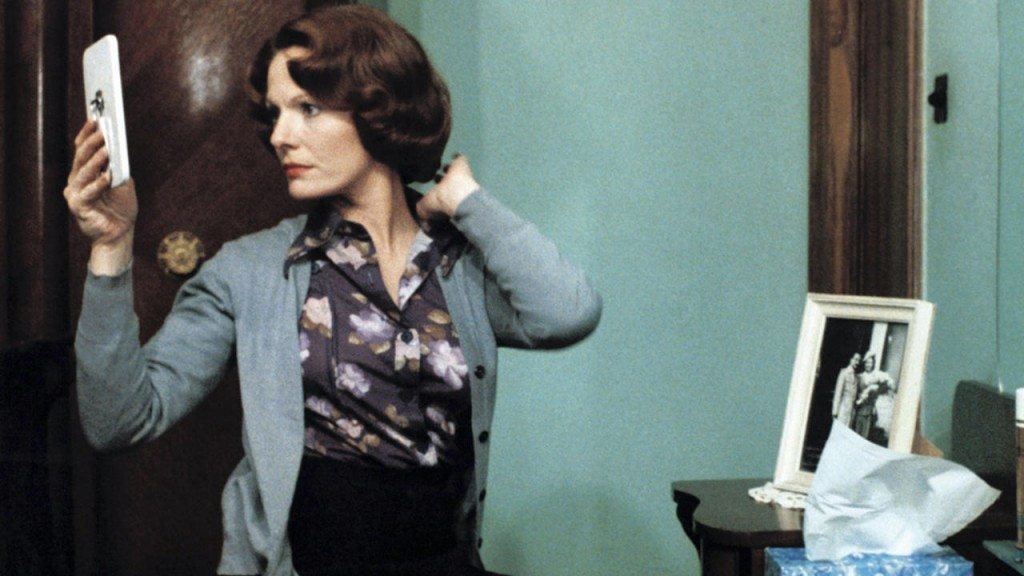
There was a short period of silence in my home, I remember, after the last shot came to a close and the credits started rolling. It was well past midnight, and I was wrapped in thought. Though it’s impossible for me to recall what was going on in my head at the time, I can say for sure that I felt as though life was a lot more than what I had thought of it previously. It was interesting to me to realize that cinema had this power to create a sort of dent in my then-existent ideology. The days after my initial viewing of the film, I began to notice strange things occurring within my actions. For example, I distinctly remember getting ready for my final year of high school the following morning and polishing my shoes in the exact same manner as Jeanne Dielman had done in the movie. It sounds like a pretty pointless thing to write about on here, but at the time, I took that action as seriously as the film’s title character did. In short, this picture latched onto me for several weeks after I had been witness to its execution, and in all honesty, I was starting to enjoy it a bit.
The film got me thinking about how boring we are as people. I’m boring, you’re boring, even the comedians who have entertained you and made you laugh till it hurt are boring. It’s only a handful of moments in every day of our lives when we do something exciting or different. Before writing this article, for instance, I did a couple of things that I am able to recall right now. I rode around on my bike, saw a couple short films, and ate shawarma for dinner. Everything else that happened to me are events I don’t consider important enough to store in my brain, and that is simply because they’re routine in nature. They happen everyday. I think it’s a core characteristic in all human beings to cherish the extraordinary, and that’s only natural. Such is the case with many of our movies as well. They portray events that don’t necessarily frequent the lives of the general public, and this is able to cause some intrigue in the minds of the audience. Maybe that’s why Jeanne Dielman, 23 Commerce Quay, 1080 Brussels stuck out to me, because it is a celebration of an uninteresting life. The film doesn’t exactly have a coherent and structured plot, and it is considered by many to be a “slow” cinematic experience. The only reason I even decided to watch the film was due to the fact that it got a Criterion Collection release. I’m glad I did though, because I was able to have one of the most fascinating episodes of my entire life the night I saw it. Funny that it was all about someone else, then.
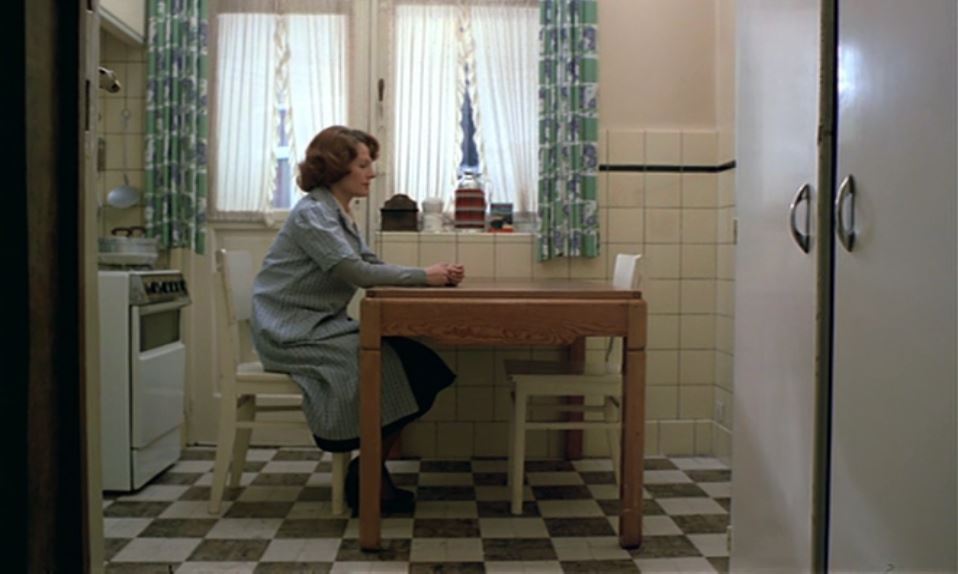
Jeanne Dielman is a film about the monotony of existence. And what better example is there to portray such a life than a mother who manages the work at home? Our protagonist is a middle-aged housewife with a past that she tries to forget. We’re never given any information about her being outside of the three days that are depicted in the movie. Her husband passed on a couple of years back, and she’s trying her best to make it through all by herself. With a son to care for and chores to do, she performs sex work for gentlemen who arrive at her place during the evening in order to raise money, and that’s about as exciting as it gets for her. Her days are meticulously woven and tightly packed with things to do that she never sees a dull moment. The points of interest in her everyday tasks as far as she is concerned are making sure that the plates are all clean, the food is cooked just right, and everything is timed to the second.
The title of this film is simply Dielman’s address. It’s the blandest way to describe a person, as there are no character traits or emotions passed on. Before viewing the picture, all we know about her is her name and where she lives. Even when we see the film, Akerman makes sure that the audience never get too close to the woman. Therefore, from the opening onward, everything is shown from a distance. There are no close-ups and there are no tilts or pans. Every shot is directed from a straight-on angle that sometimes even fails to capture our characters in satisfactory ways (or to put it more simply, like we’ve seen in other films). It’s as if the filmmakers didn’t care enough about Dielman, and this further isolates her from the rest of the world. Ironically, all of that aids in making the audience care more about the poor lonely mother, because if not for them, it feels as if there’s no one by her side. We become interested in her life, and subconsciously participate in the activities that she performs, creating a connection so strong that few other films can match up to it.
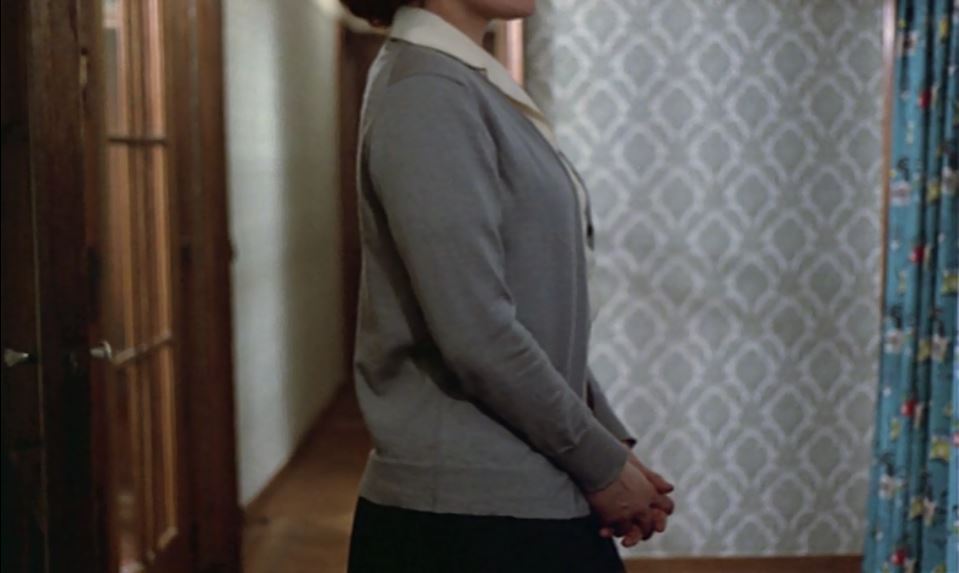
The pacing of this picture is, I will admit, slow, but it is not the type of protraction that bores. Instead, it works its way into the plot, and creates a hypnotic, almost sedative atmosphere. Household chores like making the bed, arranging the dinner table, cleaning the house, etc. take time, and the film realizes this. Therefore, when Jeanne performs these duties, they are shown in unbroken and uncut shots that go on for a long period of time. What then makes this interesting is the manner in which she goes about them. You know, I’ve read somewhere that the style in which you perform an activity tells a lot about you as a person. Perhaps the same principle is put into practice here. It might sound funny and kinda far-fetched when I say this, but I assure you that I speak with honesty when I say that I was completely fascinated by the way Ms. Dielman washed her dishes. From a silent, unmotivated, and dull task like that, I was able to learn a couple of things about her. She seemed to be worried about her approach towards those plates, and her focused functioning made me think that the reason she cared so much about something like this was to push out certain thoughts – memories, maybe – from her mind.
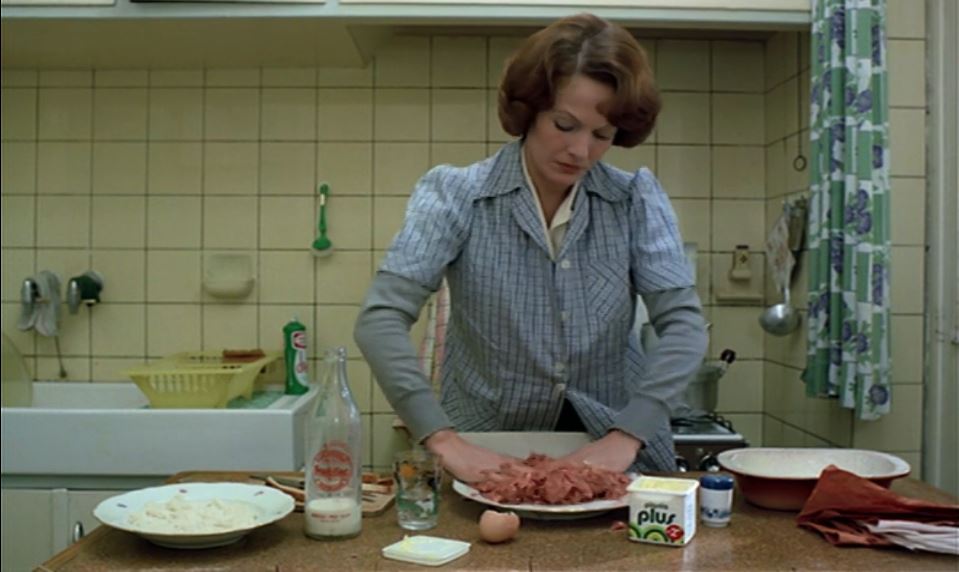
Every single errand that she performs in those three days is shown in this manner. By breaking certain filmmaking conventions, Akerman is able to put us in the shoes of her character. When she waits for her son to come back home, we do too. When she hears the front door open from the kitchen, we smile with her. Even the way she eats dinner with her son while strenuously handling a pointless conversation affects us deeply. Dielman is a troubled character, but she is also very reclusive. It is only through her reactions to the stimuli around her that we build this woman up in our heads. The director has achieved through her experimental and thoroughly innovative style a level of characterization that no other movie has been able to, at least in this magnitude.
The first major “incident” that paves the way to creating a story for this picture happens during the second day, in probably the greatest moment in the film, and one of the most beautiful scenes in cinematic history. Dielman, through her rushed and busy schedule, forgets to do something that she normally does every other day. Like other scenes in the film, there is no exposition and the audience is never told about our character’s realization. All that happens is a sudden pause while she walks into the bathroom. She just stands there, and then quickly brushes it off. Unfortunately, that break in her routine creates a sort of butterfly effect and causes certain things to happen during the third day that baffles Dielman and makes her afraid. I do not wish to spoil this portion of the story here. The film puts forth the notion that all human beings do the things they’re supposed to do so that they don’t get the time to really think. The brain is a deadly weapon, and giving it the freedom to process on its own can prove to be fatal.
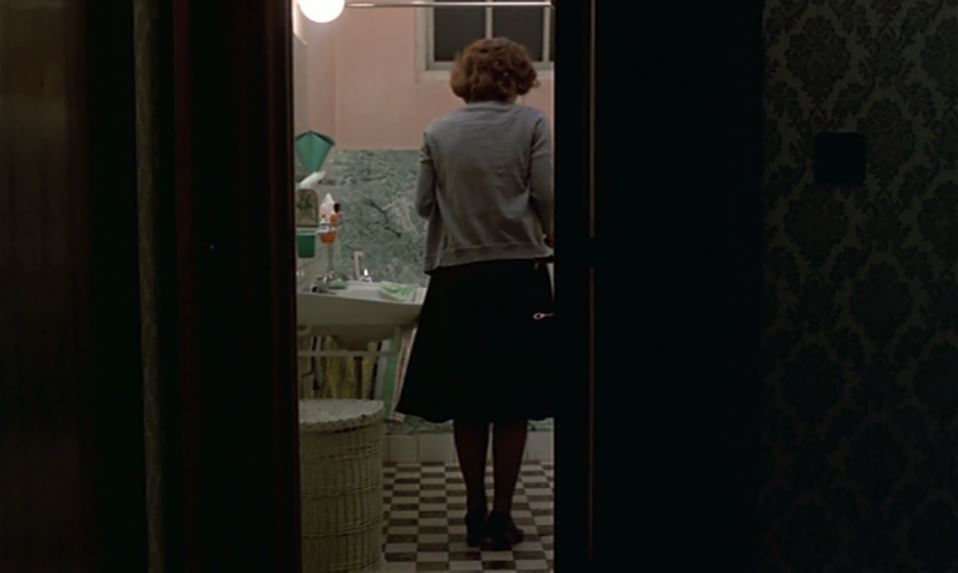
There are many scenes in this film that I can pick out and analyse for days on end. They’re all great in one way or the other, and the poetic structuring is handled in a hyper-realistic way, almost to the point where the audience feel like voyeurs, peeping into the life of a stranger without her knowledge. The slow, meditative style of capturing life has a personality of its own, and that’s where the film ultimately triumphs. A friend of mine was of the opinion that the movie makes one feel as if time has slowed down, but it is really only the pace of the picture getting closer to the pace of the real world. It’s something that you wouldn’t expect to see in a movie, really. The confidence with which all the elements have been executed is what normalizes the experience, at least to a certain degree. Comparing this to Akerman’s earlier work, it is easy to see how she experimented with time over and over to try to match reality in as best a way as possible. I believe Jeanne Dielman, 23 Commerce Quay, 1080 Brussels is where she put forward her best work, because here every single move feels calculated and focused.
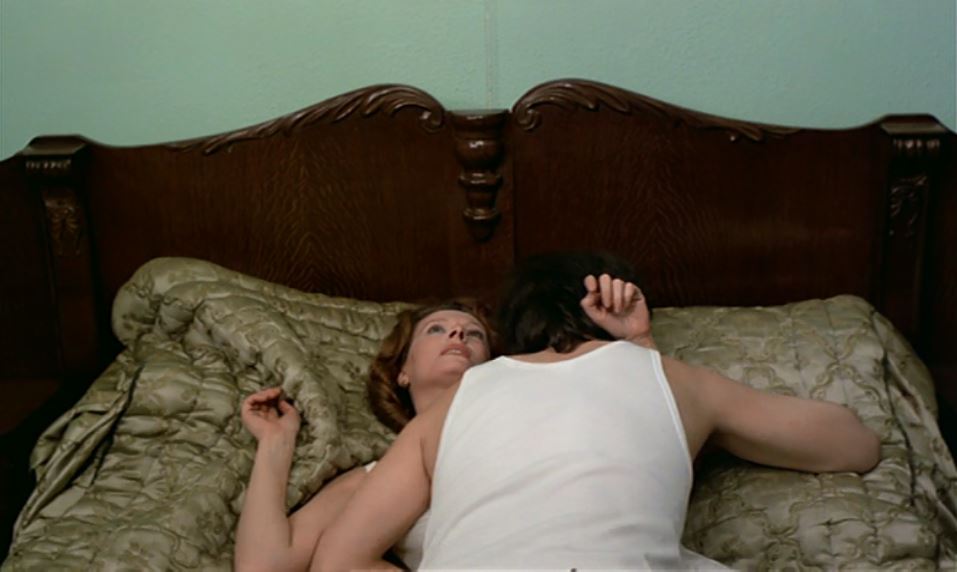
The way Jeanne Dielman captures real life, real emotions, and real actions while completely being make-believe is something to behold. Delphine Seyrig’s honest and beautiful portrayal of the title character only adds to the realism of the picture. The characters in here, they’re people I have seen around me, but never witnessed in the privacy of their homes, and that’s what I get to do through this film. The diegetic atmosphere presented brings us closer to the events that take place, and my, what captivating events they are! I worry when I see a misstep in the way Jeanne handles her daily chores, and I care deeply about this. Though I am unable to explain why I feel so, I doubt whether our beloved protagonist is able to herself. I guess, in that sense the film is more of a character study than anything else. The need of a plot and conclusion arise only with the intention of keeping the audience in their seats. Thankfully, the plot is brilliant, because watching Dielman’s comfortable lie crumble in front of her own eyes is both troubling to see as well as a strange learning experience.
The ending of this film is one I am still trying to figure out. It’s sort of like a jigsaw puzzle that solves itself. There are no answers given, and the events leading to it leave us with our eyes wide open and breath held tight, which should make the lack of a resolution rather disappointing. But it doesn’t work that way here. Slowly, without really doing anything out of the ordinary, the film gives us the satisfactory ending that we asked for, and it all happens in one steady long shot. How the film does this is a mystery to me, but that is what it has done. Jeanne Dielman, 23 Commerce Quay, 1080 Brussels has one of the greatest film endings ever, and it is as simple as an ending can get.
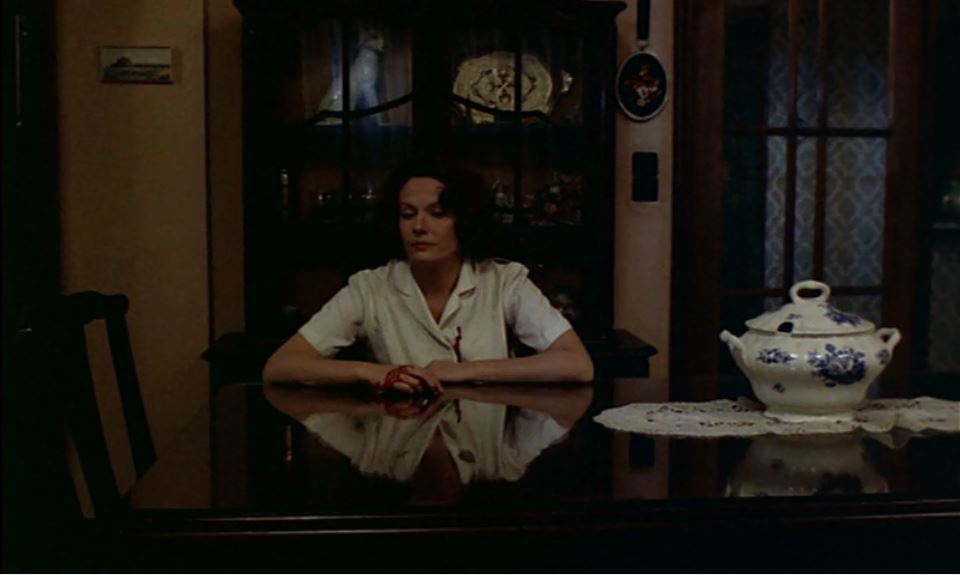
This movie, it captures life in a way that we wouldn’t normally like to ourselves. In our best photographs and home videos we have nature looking its best and people smiling and waving their hands about in happiness. We like to keep these pictures for our future selves to see, and reminisce about a time when they were truly happy. A film like this comes once in a blue moon, and it gives us an honest portrayal of what happens in between two pictures that capture pleasant moments, a valley where some of our deepest feelings lie. In a lot of ways, this movie about a woman having to face harsh reality teaches us many things about our existence as well. Specifically, the part of life that we’re afraid of examining.
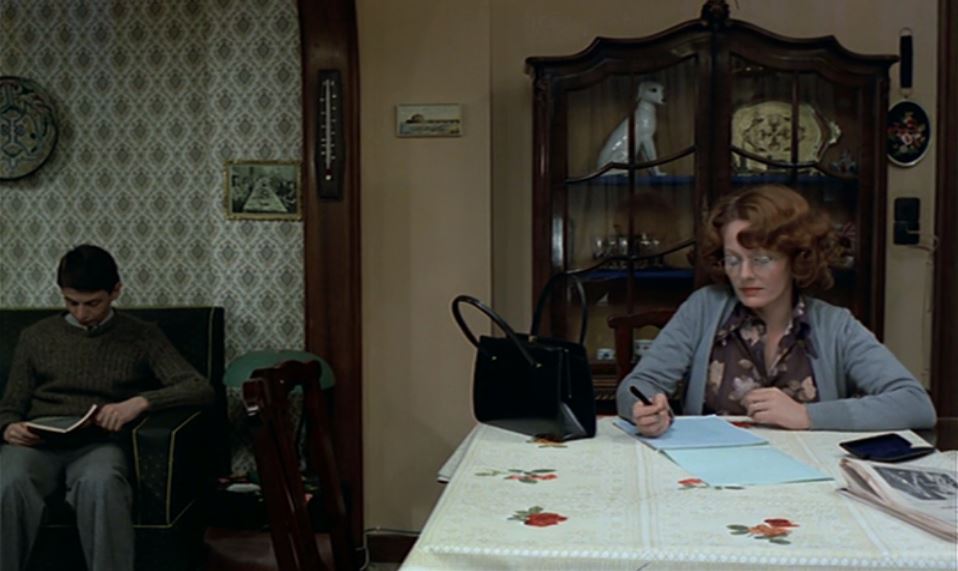
Jeanne Dielman, 23 Commerce Quay, 1080 Brussels is one of my favorite films of all time. It trains one to live life and notice things in it. A masterpiece, a classic, and a must-watch.

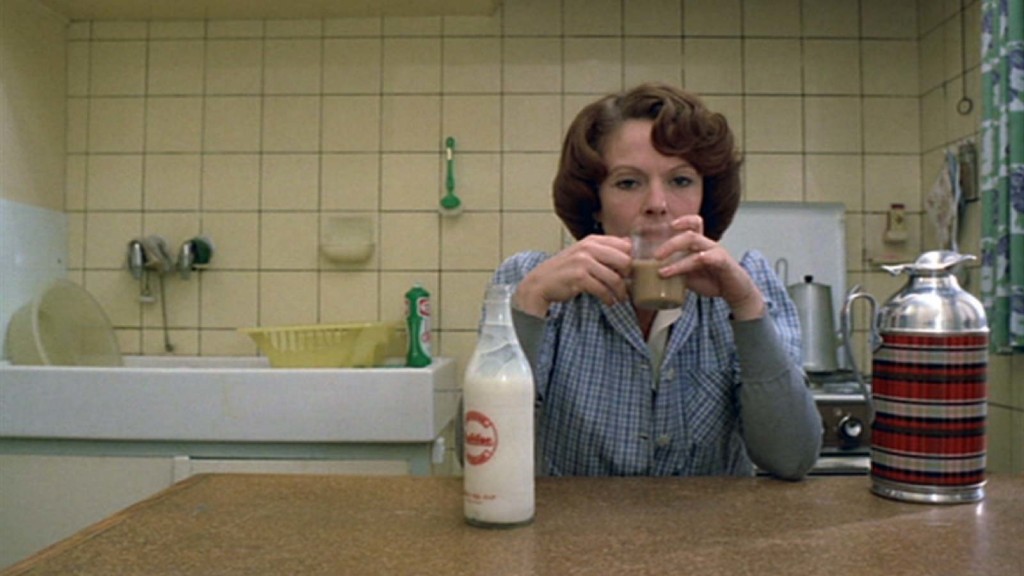
You must be logged in to post a comment.